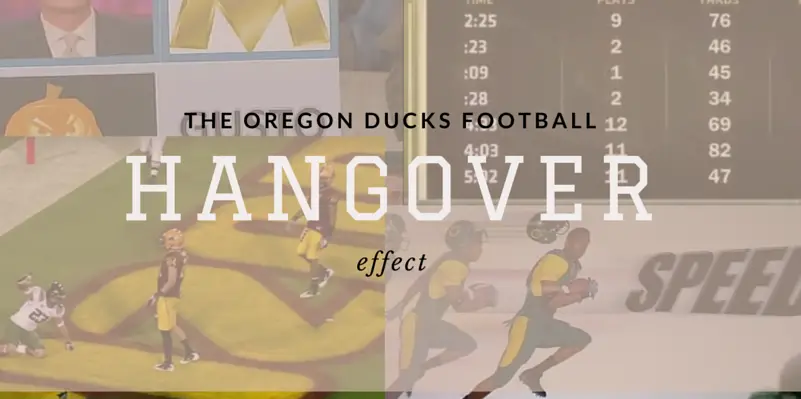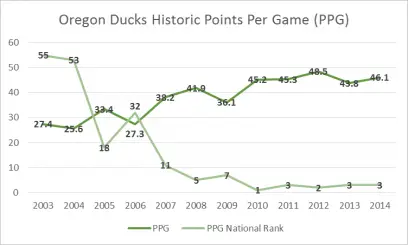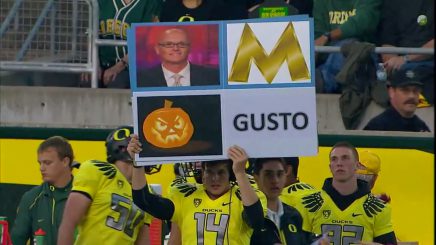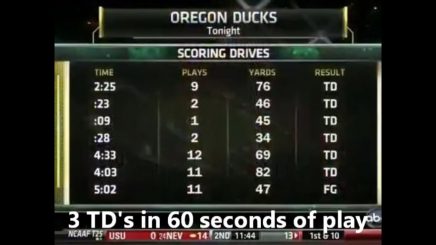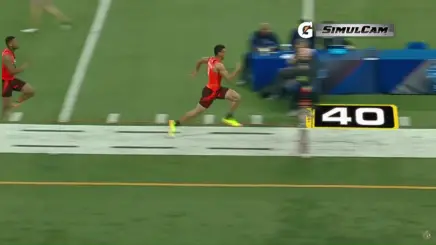Everyone knows that Oregon goes fast. Duck football is synonymous with speed and tempo and heaps and heaps of points.
This article, however, will delve into the mental aspect of the uptempo pace the Ducks have favored is seasons past, as experienced by the Ducks’ opponents. I want to know if there is a hangover effect from playing the Ducks.
Before we go there, however, let’s remember where we came from with this great two-and-half minute video from ESPN on Oregon Speed:
Oregon has led the Pac-12 in scoring every season since 2007, and the 2014 Ducks boasted the No. 2 scoring offense in the country in the regular season (47.2 points per game). That same year they averaged 21.8 seconds between plays, good for 10th in the nation.
So, of course, players get tired when playing Oregon.
The program prides itself on its players being better conditioned than the opponents and often utilizes a tempo that disallows defensive substitutions and leads to overall opponent fatigue.
This is all certainly true: more plays equal more tired opponents. Less subbing equals more tired opponents. This isn’t rocket science — it’s just simple cause and effect.
But what about the psychological impact of Oregon football on opponents? What about the hangover effect from playing and losing to the Ducks? Is there one?
Even after some research I can’t be certain — but let me proffer my thesis and show you some statistics, and you can be the judge.
The following table has small numbers, but helps to illustrate the psychological impact of the Oregon offense on opponents.
In 2014, every minute Oregon held the ball, they scored 1.74 points. By calculation, 10 minutes = 17 points; 20 minutes = 34 points; etc. It added up to a lot of points in very short windows of time.
|
TEAM |
POINTS PER MINUTE 2014 |
| 1. Oregon |
1.74 |
| 2. Baylor |
1.66 |
| 3. Marshall |
1.60 |
| 4. Western Kentucky |
1.58 |
| 5. TCU |
1.52 |
| 6. Ohio State |
1.44 |
In 2009, Chip Kelly took over as head coach of the Oregon Ducks and began fully implementing his style of play — the read option, getting play-makers the ball in space, and then running another play as quickly as possible.
It worked.
The Ducks overcame many hurdles to make the Rose Bowl in 2009 and went 12-0 the next year and played Auburn to a tie in the national championship until the final play of the game.
Never has a loss resonated so much through the college football landscape. Notice had been served. Oregon had a new coach, a new style. It wasn’t a gimmick, and it was getting results.
Behold the new Oregon offense: speed, misdirection, and points enough to make your head spin. And I use that familiar idiom on purpose — “make your head spin” — because I believe that the Oregon offense does have a mental effect on opponents.
Maybe not as much anymore — teams are more familiar with it these days — accustomed to it even. They’ve seen the games and watched the tapes and they are more mentally prepared. But in those early years I don’t think opposing coaches and players were mentally prepared for the Oregon effect.
It’s human nature as an athlete, as a competitor.
When your opponent scores, you are eager to get back out there, to even things up.
But if you get stopped, and Oregon scores again in two minutes, and then they get a turnover and score again in two minutes, and then score on special teams in a few seconds — then you look up and you’re down by 28 points and it’s still the first half – you, the opponent, can’t help but be affected.
Heck, Oregon fans are sometimes stupefied by the rapid-fire scoring. We are sometimes shocked and in awe by what we’re seeing.
It’s demoralizing to see that happen from the other side when just a few minutes ago you still felt as though you had a chance to win. Now you can’t help but feeling like giving up. What’s the point? Opposing players have to be thinking: “We can’t score enough points to keep up, much less catch up.”
As far back as 2012, Nick Saban famously opined on up-tempo offenses: “I just think there’s got to be some sense of fairness in terms of asking, ‘Is this what we want football to be?'”
That’s right. Nick Saban, one of the best college football coaches in America doesn’t think offenses like Oregon’s are “fair.” Bret Bielema chimed in with similar whiny sentiments right after leaving Wisconsin for Arkansas, before his former team would lose its third straight Rose Bowl game.
The same Bielema, whose team just lost to Toledo of the mighty MAC. Urban Meyer, a proponent of the spread, has a different reaction to Oregon’s offense:
For teams playing Oregon, the game is often over in the first quarter or first half. There is little will to keep playing, to keep competing. We’ve seen it so many times. Oregon regularly averages around 45 points per game, and the majority of those points historically have come in the second and third quarters. By the fourth, the subs are in and the game is out of hand.
Now, the good and great teams can combat this to a degree. They have more pride, more confidence, and coaches that understand the mental aspect and can coach against the tide of despair when playing Oregon. Not every team that gets down early against Oregon folds.
Look at Michigan State in 2014. The Spartans got down early and then scored three straight times. There was no fold in them, no giving up. They took a punch, got back up, and started throwing some punches of their own.
I respect that — a well-coached team with mental fortitude and a lot of highly skilled players.
Of course, we know what happened in the second half. More shock and awe, baby, as the Ducks scored 28 unanswered points. They came out of halftime thinking they were going to win (a reasonable if flawed assumption, given their lead and quick field goal), and by the end of the third quarter they were down by more than 20 points.
Ouch.
They kept fighting, sure, but it was a demoralizing second half for them. No matter what they did, it just got worse. Some opponents went as far as to fake injuries to attempt to slow Oregon’s tempo:
And for most teams who’ve played Oregon over the past five years, that’s the postscript: it just kept getting worse. Nine times in 2014 the Ducks scored 21 or more points in a single quarter, and they ranked second in the nation with 101 plays of 20-plus yards.
Overall, they were third in total offense, averaging 552.9 yards per game. How can your head not spin?
So that’s an example of the mental effect during the game, but what about after the game? What about the following week? Is there a hangover effect from playing and losing to the Ducks? Let’s look at some stats.
Oregon ranked opponents since 2010 that lost by 10+ points:
| Game | Year | Opponent | Opponent Rank | Score | Opponent Following Week Result | Notes |
| 1 | 2010 | Stanford | 9 | 52-31 | Close Win | Win, 37-35 over USC |
| 2 | 2010 | Arizona | 21 | 48-29 | Loss | Loss, 30-29, 2OT, ASU |
| 3 | 2011 | ASU | 18 | 41-27 | Win | Win, 48-14, Colorado |
| 4 | 2011 | Stanford | 4 | 53-30 | Close Win | Win, 31-28, Cal |
| 5 | 2012 | Arizona | 22 | 49-0 | Loss | Loss, 38-35, OSU |
| 6 | 2012 | UW | 23 | 52-21 | Loss | Loss, 24-14, USC |
| 7 | 2012 | OSU | 15 | 48-24 | Win | Win, Nichols State, 77-3 |
| 8 | 2013 | UW | 16 | 45-24 | Loss | Loss, 53-24, ASU |
| 9 | 2013 | UCLA | 12 | 42-14 | Win | Win, 45-23, Colorado |
| 10 | 2014 | MSU | 7 | 46-27 | Win | Win, 73-14, E Michigan |
| 11 | 2014 | UCLA | 18 | 42-30 | Close Win | Win, 36-34, Cal |
| 12 | 2014 | Utah | 17 | 51-27 | Close Win | Win, 20-17 2OT, Stanford |
| 13 | 2014 | Arizona | 7 | 51-13 | Loss | Loss, 38-30, BSU |
First, I looked at all Oregon wins since 2010 vs ranked teams that we beat by more than 10 points. Then I looked at how those teams performed the following week.
During that span we played 13 ranked teams that the Ducks defeated by more than 10 points. Of those 13, five lost the following week and four won by a field goal or less. Two of those four wins were in double overtime.
Percentage-wise, this means that 69% of the ranked teams that lost to the Ducks by 10 or more points in the last five years either lost the following week, or won the following week but only by a field goal or less.
This isn’t enough data to draw statistical conclusions except at a purely anecdotal level; however, it sure looks as if there is a hangover effect from playing the Ducks.
Nearly 70% of the time teams lose, or at least struggle to win the following week. Now, there are a ton of variables at work here — the opponent the following week being the biggest.
For example, Oregon killed the ranked Oregon State Beavers in 2012, but they played Nichols State the following week and won 77-3.
Playing Nichols State after playing the Ducks is like drinking V8 juice, taking two aspirin, and getting a massage after a hard night. It’s the perfect prescription for a quick recovery. Maybe all teams should schedule a Nichols State for the week after the Ducks, eh?
There will always be variables like that, but even with them there appears to be a hangover effect from playing the Ducks. And that’s only looking at teams that were ranked when they played us.
Heck, sometimes we play so fast even the refs fall down:
I’m not sure these in-game and post-game effects will continue, however, for a few reasons.
First, teams are scoring a lot more than they used to, particularly in the Pac-12. And those teams know they can score on anyone. So they come into the game knowing Oregon will score a lot but also believing they will score a ton also.
So when Oregon reels off 14 straight points, the impact in-game isn’t the same because our opponents believe they can come back.
Coaches are no doubt combating the in-game effect by coaching up their teams prior to playing, not just Oregon, but pretty much any Pac-12 teams.
If I were a coach I’d be telling them all week, “Don’t worry about the score; everybody in the Pac-12 can score in bunches.” Still, at the end of 2014, the Ducks scored 51 points against 10th-ranked Arizona and then followed that up by scoring 59 points against 3rd-ranked Florida State.
However, the post-game hangover effect may not continue for an entirely different reason: Oregon has slowed down some; although it still runs with a fast tempo and certainly makes defenses tired, we don’t do it all the time.
Scott Frost and Mark Helfrich appear to be content to run hurry-up only some of the time instead of going at warp speed most of the time. Despite that, we were still 10th in the nation last year in terms of time between plays (21.8 seconds).
The Ducks also don’t have Mariota anymore and are replacing some key starters on the offensive line.
The differences were clear against Michigan State, but, remember, Michigan State happens to be one of the best teams in the country, and they were lucky to escape with a victory.
2014 Season Game by Game Results:
| OPPONENT | RESULT | RUSH YARDS | PASS YARDS | PLAYS | TOTAL YARDS | YARDS/ PLAY | T.O.P |
| South Dakota | W 62-13 | 293 | 380 | 70 | 673 | 9.61 | 20:56 |
| 7 Michigan St. | W 46-27 | 173 | 318 | 68 | 491 | 7.22 | 26:20 |
| Wyoming | W 48-14 | 263 | 293 | 68 | 556 | 8.18 | 22:22 |
| at Wash. St. | W 38-31 | 172 | 329 | 67 | 501 | 7.48 | 28:13 |
| 12 Arizona | L 24-31 | 144 | 302 | 74 | 446 | 6.03 | 26:28 |
| at 14 UCLA | W 42-30 | 258 | 210 | 68 | 468 | 6.88 | 22:27 |
| Washington | W 45-20 | 218 | 336 | 83 | 554 | 6.67 | 29:27 |
| at California | W 59-41 | 264 | 326 | 76 | 590 | 7.76 | 26:35 |
| Stanford | W 45-16 | 267 | 258 | 77 | 525 | 6.82 | 35:38 |
| at 23 Utah | W 51-27 | 269 | 239 | 79 | 508 | 6.43 | 30:25 |
| Colorado | W 44-10 | 265 | 332 | 77 | 597 | 7.75 | 28:20 |
| at Oregon St. | W 47-19 | 198 | 367 | 65 | 565 | 8.69 | 26:31 |
| 12 Arizona | W 51-13 | 301 | 326 | 94 | 627 | 6.67 | 38:55 |
| 2 Florida St. | W 59-20 | 301 | 338 | 81 | 639 | 7.89 | 32:43 |
| Averages | 47 (PF) -22 (PA) | 242 | 311 | 75 | 553 | 7.43 | 28:12 |

Scott Frost talks to reporters after practice. Frost and Helfrich could pick up the play-calling pace and really work at wearing teams down both physically and mentally.
It’s a given that Oregon Duck football will bring back the shock and awe and warp speed of previous seasons and stomp right through what appears to be a weaker-than-last-year Pac-12 North.
Things will improve as Adams gains experience and so will the offensive line and the young secondary.
I’m still hoping for a return to the playoffs, but personally, I’d be very happy with a Pac-12 Championship (our third in five years) and a return to the Rose Bowl (also our third in five years), but National Champion Oregon Ducks has a nice ring to it.
Top photo from video
David, a father of two young Oregon fans, has been a Duck all his life after growing up in Eugene. Although not UO Alumni, his wife was a Journalism major there, and he has stayed true to his Ducks wherever life has taken him. In addition to watching the Ducks each Saturday with up to 200 fans at the Irish Channel in Washington, D.C., he has enjoyed playing tackle football with friends each fall for 25 consecutive years, regularly implementing the latest Oregon offensive wrinkle to stymie defenses. David has been writing short stories all of his adult life for fun and is excited to be writing about the Ducks on Fishduck.com.

